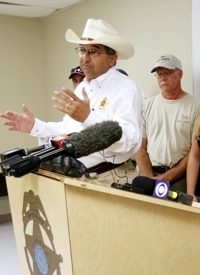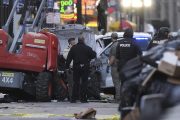
On April 19, MSNBC.com discussed the details of a U.S. State Department report about the increasing number of Americans caught in the crossfire of the Mexican cartel drug wars. According to MSNBC, some of those killed were working for the cartels. But in recent months, reports of innocent civilians and law enforcement officers have made headlines. The high profile deaths of Nancy Davis, Jaime Zapata, Brian Terry, and David Hartley, reveal the non-discriminatory nature of drug cartel murder.
Missionary Nancy Davis, a south Texas resident, was murdered when the vehicle in which she and her husband were traveling was ambushed in Mexico and shots were fired through the windows. She died as her husband sped to the Texas border. Border Patrol agent Brian Terry was killed late last year in a shootout involving cartel members, but the details are still murky in his case. U.S. Immigration and Customs Enforcement (ICE) Agent Jaime Zapata was shot and his partner Victor Avila wounded when gunmen opened fire on the agents’ vehicle. Hartley, simply a civilian vacationing on Falcon Lake, was gunned down in front of his wife while jet-skiing on the dammed section of the Rio Grande River, the international border between Texas and Mexico. His widow, Tiffany, has begun an anti-cartel crusade, demanding that officials find her husband’s body.
The MSNBC article referenced a State Department report (The New American could not confirm the report) that homicide claimed the lives of at least 106 U.S. residents in Mexico in 2010, up from 79 in 2009, but that the number is probably much higher because the State Department doesn’t list cases in which Americans have vanished, or have been killed in the U.S. by Mexican drug gangs.
MSNBC continued:
“You have a lot of folks who are dual citizens, with some born in the U.S. but [who] live on the Mexico side," Scott Stewart, a vice president with the global intelligence firm STRATFOR [Austin, Texas], said of the difficulty in documenting American deaths connected to cartel violence. "A lot of them are working back and forth and some are working as gunmen too. And when someone like that dies, it is hard to know. Some simply disappear while others are lying in a vat of lye or dumped into a mass grave."
In spit of assurances from U.S. Secretary of Homeland Security Janet Napolitano that the border is safe and secure, residents on the border know better, and expect an increase in the number of American deaths if the drug wars cannot be stopped. Mrs. Hartley told MSNBC, "These cartels will stop at nothing. The violence is not going to stop and more will die at the unforgiving hands of cartels."
The police department of Zapata, Texas, on the border (about 150 miles southwest of Corpus Christi), investigated the Hartley case. The Sheriff of Zapata County, Sigifredo Gonzalez, had this to say: “How many more have to die for the U.S. to take action? I’m not saying let’s invade Mexico but the truth is Mexico does not own its border. The cartels do."
On Oct. 31 El Paso resident Edgar Lopez was killed in Juarez when gunmen opened fire on him and two others a day after Americans Giovanna Herrera and Luis Arazia were killed just after crossing the Juarez-El Paso international bridge.
Meanwhile, the Bureau of Alcohol, Tobacco, and Firearms traffics guns to cartel members.
U.S. Representative Michael McCaul (R-Texas, 10th) said, “The shooting of special agents Zapata and Avila is a game changer which alters the landscape of the involvement of the United States in Mexico’s war against the drug cartels. For the first time in 25 years, the cartels are now targeting American law enforcement." McCaul is a former federal prosecutor and Chairman of the Homeland Security Subcommittee on Oversight, Investigations and Management, and earlier this month introduced a bill to designate Mexican drug cartels as “foreign terrorist organizations.’
Sheriff Gonzalez summed it up: “The feds say our side of the border is safe but we have bullet holes in our schools and businesses that say otherwise.”
Photo: Zapata County Sheriff Sigifredo Gonzalez, Jr., takes part in a news conference with Tiffany Hartley and family members (out of picture) Oct. 6, 2010 in Zapata, Texas: AP Images



